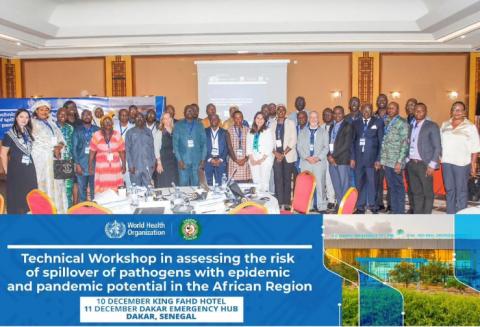
The West African Health Organization (WAHO) and the World Health Organization (WHO) jointly organized a technical workshop in Dakar, Senegal, on 10 and 11 December 2024. The main objective of this event, held at the King Fahd Palace Hotel and the WHO Emergency Hub in Dakar, was to assess the risks of zoonotic transmission (spillover) of pathogens with epidemic and pandemic potential. It aimed to strengthen surveillance and response capacities for emerging diseases in the region while exploring opportunities for collaboration to better anticipate future risks.
This workshop takes place in a context where increasing interactions between human populations, animal reservoirs, and environmental ecosystems raise the risk of pathogen transmission. Rapid urbanization and encroachment on natural habitats increase these risks, creating conditions conducive to the emergence of
new diseases. Discussions focused on understanding transmission mechanisms, including interactions between animal reservoirs and humans, as well as the impact of climate change on transmission patterns.
A key point discussed was to revisit risk analysis tools, including WHO-developed risk maps, which help identify high-risk areas and strategically target interventions. The definition of priorities for effective surveillance and prevention was enriched by in-depth exchanges between experts, aimed at addressing current gaps in research and coordination between different actors. These collective efforts contribute to laying the foundations for a more robust regional strategy adapted to local realities.
Speaking online from WHO headquarters in Geneva, WHO Representative Dr. Maria VAN KERKHOVE stressed the importance of strengthening surveillance and prevention systems at the human-animal-environment interface. She stressed a coordinated approach among Member States and partners to reduce the risks of zoonotic transmission. “WHO remains committed to supporting countries in identifying priority areas and implementing evidence-based interventions,” she said.
Speaking on behalf of the Director General of WAHO, Professor Issiaka SOMBIE, present in Dakar opened the workshop and highlighted the strategic challenges of this workshop for ECOWAS countries and beyond. He recalled that countries in the region share similar ecosystems and face common challenges related to the management of cross-border health risks. According to him, it is essential to strengthen regional cooperation by mobilizing available human, technical, and financial resources to improve the collective capacity to prevent
and respond to health crises. “Strengthening surveillance, particularly in areas identified as being at high risk of transmission, is an absolute priority. Professor SOMBIE also stressed the importance of creating and maintaining strong partnerships between national, regional, and international actors. These partnerships will not only fill current gaps in surveillance and research but also promote effective sharing of knowledge and data between countries. He concluded by recalling that “harmonizing efforts through a coordinated regional strategy is essential to protect the health of populations across the sub-region and beyond.”
The workshop helped to define regional priorities for surveillance and develop a strategic roadmap for concerted actions, with a particular focus on local capacity building and coordination across sectors. Participants stressed that the integrated One Health approach remains essential to address the complex challenges related to the interactions between human, animal, and environmental ecosystems while fostering close collaboration between national and international actors.
About WAHO
The West African Health Organization (WAHO) is the specialized health agency of ECOWAS. Its mission is to achieve the highest possible standards and protect the health of the populations of the West African sub-region. Through collaboration with Member States and partners, WAHO strives to harmonize policies, pool
resources, and collectively address health challenges in the region.
